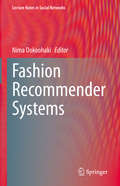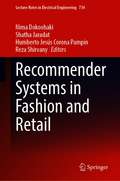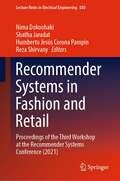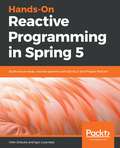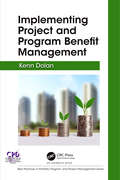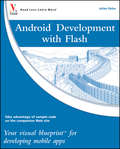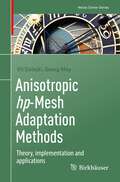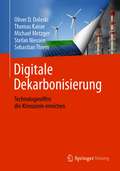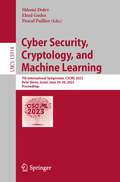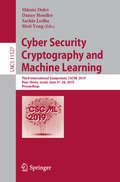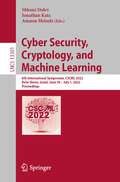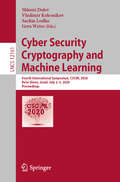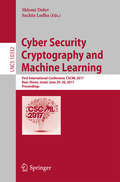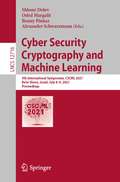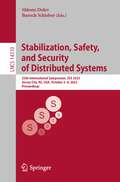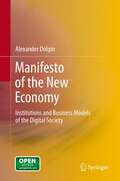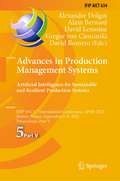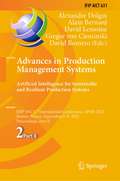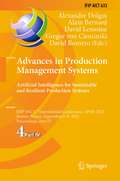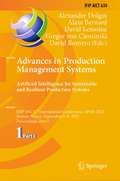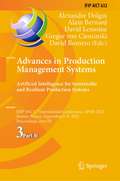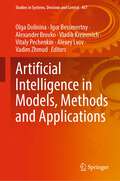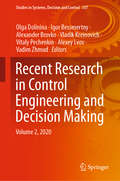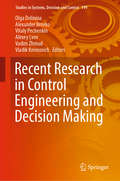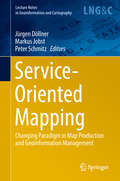- Table View
- List View
Fashion Recommender Systems (Lecture Notes in Social Networks)
by Nima DokoohakiThis book includes the proceedings of the first workshop on Recommender Systems in Fashion 2019. It presents a state of the art view of the advancements within the field of recommendation systems with focused application to e-commerce, retail and fashion. The volume covers contributions from academic as well as industrial researchers active within this emerging new field.Recommender Systems are often used to solve different complex problems in this scenario, such as social fashion-based recommendations (outfits inspired by influencers), product recommendations, or size and fit recommendations. The impact of social networks and the influence that fashion influencers have on the choices people make for shopping is undeniable. For instance, many people use Instagram to learn about fashion trends from top influencers, which helps them to buy similar or even exact outfits from the tagged brands in the post. When traced, customers’ social behavior can be a very useful guide for online shopping websites, providing insights on the styles the customers are really interested in, and hence aiding the online shops in offering better recommendations and facilitating customers quest for outfits. Another well known difficulty with recommendation of similar items is the large quantities of clothing items which can be considered similar, but belong to different brands. Relying only on implicit customer behavioral data will not be sufficient in the coming future to distinguish between for recommendation that will lead to an item being purchased and kept, vs. a recommendation that might result in either the customer not following it, or eventually return the item. Finding the right size and fit for clothes is one of the major factors not only impacting customers purchase decision, but also their satisfaction from e-commerce fashion platforms. Moreover, fashion articles have important sizing variations. Finally, customer preferences towards perceived article size and fit for their body remain highly personal and subjective which influences the definition of the right size for each customer.The combination of the above factors leaves the customers alone to face a highly challenging problem of determining the right size and fit during their purchase journey, which in turn has resulted in having more than one third of apparel returns to be caused by not ordering the right article size. This challenge presents a huge opportunity for research in intelligent size and fit recommendation systems and machine learning solutions with direct impact on both customer satisfaction and business profitability.
Recommender Systems in Fashion and Retail (Lecture Notes in Electrical Engineering #734)
by Nima Dokoohaki Shatha Jaradat Humberto Jesús Corona Pampín Reza ShirvanyThis book includes the proceedings of the second workshop on recommender systems in fashion and retail (2020), and it aims to present a state-of-the-art view of the advancements within the field of recommendation systems with focused application to e-commerce, retail, and fashion by presenting readers with chapters covering contributions from academic as well as industrial researchers active within this emerging new field. Recommender systems are often used to solve different complex problems in this scenario, such as product recommendations, or size and fit recommendations, and social media-influenced recommendations (outfits worn by influencers).
Recommender Systems in Fashion and Retail: Proceedings of the Third Workshop at the Recommender Systems Conference (2021) (Lecture Notes in Electrical Engineering #830)
by Nima Dokoohaki Shatha Jaradat Humberto Jesús Corona Pampín Reza ShirvanyThis book includes the proceedings of the third workshop on recommender systems in fashion and retail (2021), and it aims to present a state-of-the-art view of the advancements within the field of recommendation systems with focused application to e-commerce, retail, and fashion by presenting readers with chapters covering contributions from academic as well as industrial researchers active within this emerging new field. Recommender systems are often used to solve different complex problems in this scenario, such as product recommendations, size and fit recommendations, and social media-influenced recommendations (outfits worn by influencers).
Hands-On Reactive Programming in Spring 5: Build cloud-ready, reactive systems with Spring 5 and Project Reactor
by Oleh Dokuka Igor LozynskyiExplore the reactive system and create efficient microservices with Spring Boot 2.1 and Spring CloudKey FeaturesUnderstand the kind of system modern businesses require with SpringGain deeper insights into reactive programming with Reactor and Spring CloudGet in-depth knowledge on asynchronous and nonblocking communication with Spring 5 WebFluxBook DescriptionThese days, businesses need a new type of system that can remain responsive at all times. This is achievable with reactive programming; however, the development of these kinds of systems is a complex task, requiring a deep understanding of the domain. In order to develop highly responsive systems, the developers of the Spring Framework came up with Project Reactor.Hands-On Reactive Programming in Spring 5 begins with the fundamentals of Spring Reactive programming. You’ll explore the endless possibilities of building efficient reactive systems with the Spring 5 Framework along with other tools such as WebFlux and Spring Boot. Further on, you’ll study reactive programming techniques and apply them to databases and cross-server communication. You will advance your skills in scaling up Spring Cloud Streams and run independent, high-performant reactive microservices.By the end of the book, you will be able to put your skills to use and get on board with the reactive revolution in Spring 5.1!What you will learnDiscover the difference between a reactive system and reactive programmingExplore the benefits of a reactive system and understand its applicationsGet to grips with using reactive programming in Spring 5Gain an understanding of Project ReactorBuild a reactive system using Spring 5 and Project ReactorCreate a highly efficient reactive microservice with Spring CloudTest, monitor, and release reactive applicationsWho this book is forThis book is for Java developers who use Spring to develop their applications and want to build robust and reactive applications that can scale in the cloud. Basic knowledge of distributed systems and asynchronous programming will help you understand the concepts covered in this book.
Implementing Project and Program Benefit Management (Best Practices in Portfolio, Program, and Project Management)
by Kenn DolanOne of the most difficult, yet important, questions regarding projects is "What advantages will this project create for the investors and key stakeholders?" Projects and programs should be treated as investments. This means that the focus of projects shifts from delivering within the triple constraints (time–cost–quality) towards some of the more fundamental questions: <P><P> <li>What is the purpose of this investment? <li>What are the specific advantages expected? <li>Are these benefits worth the investment? <P><P>Implementing Project and Program Benefit Management is written for executives and practitioners within the portfolio, program, and project environment. It guides them through the important work that must be addressed as the investment progresses towards the realization of benefits. The processes discussed cover the strategic elements of benefits realization as well as the more detailed requirements, which are the domain of the program delivery teams and the operational users. Using real cases to explain complex situations, operational teams and wider groups of stakeholders, including communities affected by infrastructure projects, will be able to engage in the conversation with the sponsors and delivery teams. <P><P>Covering an area of program and project management that is rapidly becoming more widely valued, this book blends theory with practical experience to present a clear process flow to managing the benefits life cycle. Best practices are defined, and pitfalls and traps are identified to enable practitioners to apply rigor and structure to this crucial discipline.
Android Development with Flash
by Julian DolceThe visual guide to developing for one of the world's hottest new mobile platforms, the Android OSThe Android operating system works on phones that combine a camera, Web browser, e-mail, GPS, and mapping tool into a single accessible pocket-sized unit, and can function on computers, as well. Aimed at visual learners and packed with hundreds of screen shots, this guide brings Flash developers up to speed on the necessary factors to take into account when developing for this touch-based, mobile platform. Experienced Flash developer Julian Dolce escorts you through the process of creating applications for the Android OS using the Flash CS5 development platform and informs you of best practices to try as well as common pitfalls to avoid.Guides you step by step through the process of creating applications for the Android OS using Flash CS5Explores the capabilities and limitations of developing apps for the Android OSPoints out common pitfalls and teaches you best practicesFeatures hundreds of screen shots to assist with visual learningAndroid Development with Flash: Your visual blueprint for developing mobile apps gets you on your way to developing apps for Android... in a flash!
Anisotropic hp-Mesh Adaptation Methods: Theory, implementation and applications (Nečas Center Series)
by Vít Dolejší Georg MayMesh adaptation methods can have a profound impact on the numerical solution of partial differential equations. If devised and implemented properly, adaptation significantly reduces the size of the algebraic systems resulting from the discretization, while ensuring that applicable error tolerances are met. In this monograph, drawing from many years of experience, the authors give a comprehensive presentation of metric-based anisotropic hp-mesh adaptation methods.A large part of this monograph is devoted to the derivation of computable interpolation error estimates on simplicial meshes, which take into account the geometry of mesh elements as well as the anisotropic features of the interpolated function. These estimates are then used for the optimization of corresponding finite element spaces in a variety of settings. Both steady and time dependent problems are treated, as well as goal-oriented adaptation. Practical aspects of implementation are also explored, including several algorithms. Many numerical experiments using the discontinuous Galerkin method are presented to illustrate the performance of the adaptive techniques.This monograph is intended for scientists and researchers, including doctoral and master-level students. Portions of the text can also be used as study material for advanced university lectures concerning a posteriori error analysis and mesh adaptation.
Digitale Dekarbonisierung: Technologieoffen die Klimaziele erreichen
by Oliver D. Doleski Thomas Kaiser Michael Metzger Stefan Niessen Sebastian ThiemDas Buch liefert erstmals konkrete Antworten auf die Frage, wie datenbasierte Verfahren bei der Dekarbonisierung von Betriebsprozessen helfen können. Der Text beschränkt sich dabei nicht auf die üblichen Ansätze zur Reduzierung klimaschädlicher Treibhausgasemissionen wie bspw. dem Verzicht des Einsatzes fossiler Energieträger. Vielmehr wird in dem Text der pragmatische und vor allem technologieoffene Blick auf die Dekarbonisierung energieintensiver Prozesse oder Verfahren gelenkt und dem Leser ein datenanalytisches Modell zur Optimierung des Energiesystems, welches dann deutlich weniger Treibhausgase emittiert, vorgestellt.
Cyber Security, Cryptology, and Machine Learning: 7th International Symposium, CSCML 2023, Be'er Sheva, Israel, June 29–30, 2023, Proceedings (Lecture Notes in Computer Science #13914)
by Shlomi Dolev Ehud Gudes Pascal PaillierThis book constitutes the refereed proceedings of the 7th International Symposium on Cyber Security, Cryptology, and Machine Learning, CSCML 2023, held in Be'er Sheva, Israel, in June 2023.The 21 full and 15 short papers were carefully reviewed and selected from 70 submissions. They deal with the theory, design, analysis, implementation, and application of cyber security, cryptography and machine learning systems and networks, and conceptually innovative topics in these research areas.
Cyber Security Cryptography and Machine Learning: Third International Symposium, CSCML 2019, Beer-Sheva, Israel, June 27–28, 2019, Proceedings (Lecture Notes in Computer Science #11527)
by Shlomi Dolev Danny Hendler Sachin Lodha Moti YungThis book constitutes the refereed proceedings of the Third International Symposium on Cyber Security Cryptography and Machine Learning, CSCML 2019, held in Beer-Sheva, Israel, in June 2019.The 18 full and 10 short papers presented in this volume were carefully reviewed and selected from 36 submissions. They deal with the theory, design, analysis, implementation, or application of cyber security, cryptography and machine learning systems and networks, and conceptually innovative topics in these research areas.
Cyber Security, Cryptology, and Machine Learning: 6th International Symposium, CSCML 2022, Be'er Sheva, Israel, June 30 – July 1, 2022, Proceedings (Lecture Notes in Computer Science #13301)
by Shlomi Dolev Jonathan Katz Amnon MeiselsThis book constitutes the refereed proceedings of the 6th International Symposium on Cyber Security Cryptography and Machine Learning, CSCML 2022, held in Be'er Sheva, Israel, in June - July 2022. The 24 full and 11 short papers presented together with a keynote paper in this volume were carefully reviewed and selected from 53 submissions. They deal with the theory, design, analysis, implementation, or application of cyber security, cryptography and machine learning systems and networks, and conceptually innovative topics in these research areas.
Cyber Security Cryptography and Machine Learning: Fourth International Symposium, CSCML 2020, Be'er Sheva, Israel, July 2–3, 2020, Proceedings (Lecture Notes in Computer Science #12161)
by Shlomi Dolev Vladimir Kolesnikov Sachin Lodha Gera WeissThis book constitutes the refereed proceedings of the Fourth International Symposium on Cyber Security Cryptography and Machine Learning, CSCML 2020, held in Beer-Sheva, Israel, in July 2020.The 12 full and 4 short papers presented in this volume were carefully reviewed and selected from 38 submissions. They deal with the theory, design, analysis, implementation, or application of cyber security, cryptography and machine learning systems and networks, and conceptually innovative topics in these research areas.
Cyber Security Cryptography and Machine Learning: First International Conference, CSCML 2017, Beer-Sheva, Israel, June 29-30, 2017, Proceedings (Lecture Notes in Computer Science #10332)
by Shlomi Dolev Sachin LodhaThis book constitutes the proceedings of the first International Symposium on Cyber Security Cryptography and Machine Learning, held in Beer-Sheva, Israel, in June 2017. The 17 full and 4 short papers presented include cyber security; secure software development methodologies, formal methods semantics and verification of secure systems; fault tolerance, reliability, availability of distributed secure systems; game-theoretic approaches to secure computing; automatic recovery of self-stabilizing and self-organizing systems; communication, authentication and identification security; cyber security for mobile and Internet of things; cyber security of corporations; security and privacy for cloud, edge and fog computing; cryptography; cryptographic implementation analysis and construction; secure multi-party computation; privacy-enhancing technologies and anonymity; post-quantum cryptography and security; machine learning and big data; anomaly detection and malware identification; business intelligence and security; digital forensics; digital rights management; trust management and reputation systems; information retrieval, risk analysis, DoS.
Cyber Security Cryptography and Machine Learning: 5th International Symposium, CSCML 2021, Be'er Sheva, Israel, July 8–9, 2021, Proceedings (Lecture Notes in Computer Science #12716)
by Shlomi Dolev Oded Margalit Benny Pinkas Alexander SchwarzmannThis book constitutes the refereed proceedings of the 5th International Symposium on Cyber Security Cryptography and Machine Learning, CSCML 2021, held in Be'er Sheva, Israel, in July 2021.The 22 full and 13 short papers presented together with a keynote paper in this volume were carefully reviewed and selected from 48 submissions. They deal with the theory, design, analysis, implementation, or application of cyber security, cryptography and machine learning systems and networks, and conceptually innovative topics in these research areas.
Stabilization, Safety, and Security of Distributed Systems: 25th International Symposium, SSS 2023, Jersey City, NJ, USA, October 2–4, 2023, Proceedings (Lecture Notes in Computer Science #14310)
by Shlomi Dolev Baruch SchieberThis book constitutes the proceedings of 25th International Symposium, SSS 2023, in Jersey City, NJ, USA, in October 2023.The 32 full papers presented together with 8 short papers were carefully reviewed and selected from 78 submissions. The conference was organized into five tracks reflecting major trends related to the conference: (i) Track A. Self-stabilizing Systems: Theory and Practice, (ii) Track B. Distributed and Concurrent Computing: Foundations, Fault-Tolerance and Scalability, (iii) Track C. Cryptogrophy and Security, (iv) Track D. Dynamic, Mobile and Nature-Inspired Computing Mobile Agents, (v) and Distributed Databases.
Manifesto of the New Economy: Institutions and Business Models of the Digital Society
by Alexander DolginThe book describes the main directions for the development of the digital society. The author angles its book to those who are interested to know what would replace search engines, and how social networks would evolve; what profit can be made of different forms of informational collaboration (crowdsourcing, collaborative filtering). And, the main thing, how it will influence the structure of the society and human pursuit for happiness. The author does not confine himself to a theory, he sets and solves practical questions: How talent, success and "stardom" are interconnected, how to make money in social networks, what is the business model for the development of entertainment and media, how to measure cultural values, and what is the subjective time of the individual and how to make it qualitative? There have been no answers to these questions before. Internet and social networks have provided tools and data that Alexander Dolgin was the first to use in economics.
Advances in Production Management Systems. Artificial Intelligence for Sustainable and Resilient Production Systems: IFIP WG 5.7 International Conference, APMS 2021, Nantes, France, September 5–9, 2021, Proceedings, Part V (IFIP Advances in Information and Communication Technology #634)
by Alexandre Dolgui Alain Bernard David Lemoine Gregor Von Cieminski David RomeroThe five-volume set IFIP AICT 630, 631, 632, 633, and 634 constitutes the refereed proceedings of the International IFIP WG 5.7 Conference on Advances in Production Management Systems, APMS 2021, held in Nantes, France, in September 2021.*The 378 papers presented were carefully reviewed and selected from 529 submissions. They discuss artificial intelligence techniques, decision aid and new and renewed paradigms for sustainable and resilient production systems at four-wall factory and value chain levels. The papers are organized in the following topical sections: Part I: artificial intelligence based optimization techniques for demand-driven manufacturing; hybrid approaches for production planning and scheduling; intelligent systems for manufacturing planning and control in the industry 4.0; learning and robust decision support systems for agile manufacturing environments; low-code and model-driven engineering for production system; meta-heuristics and optimization techniques for energy-oriented manufacturing systems; metaheuristics for production systems; modern analytics and new AI-based smart techniques for replenishment and production planning under uncertainty; system identification for manufacturing control applications; and the future of lean thinking and practice Part II: digital transformation of SME manufacturers: the crucial role of standard; digital transformations towards supply chain resiliency; engineering of smart-product-service-systems of the future; lean and Six Sigma in services healthcare; new trends and challenges in reconfigurable, flexible or agile production system; production management in food supply chains; and sustainability in production planning and lot-sizing Part III: autonomous robots in delivery logistics; digital transformation approaches in production management; finance-driven supply chain; gastronomic service system design; modern scheduling and applications in industry 4.0; recent advances in sustainable manufacturing; regular session: green production and circularity concepts; regular session: improvement models and methods for green and innovative systems; regular session: supply chain and routing management; regular session: robotics and human aspects; regular session: classification and data management methods; smart supply chain and production in society 5.0 era; and supply chain risk management under coronavirus Part IV: AI for resilience in global supply chain networks in the context of pandemic disruptions; blockchain in the operations and supply chain management; data-based services as key enablers for smart products, manufacturing and assembly; data-driven methods for supply chain optimization; digital twins based on systems engineering and semantic modeling; digital twins in companies first developments and future challenges; human-centered artificial intelligence in smart manufacturing for the operator 4.0; operations management in engineer-to-order manufacturing; product and asset life cycle management for smart and sustainable manufacturing systems; robotics technologies for control, smart manufacturing and logistics; serious games analytics: improving games and learning support; smart and sustainable production and supply chains; smart methods and techniques for sustainable supply chain management; the new digital lean manufacturing paradigm; and the role of emerging technologies in disaster relief operations: lessons from COVID-19 Part V: data-driven platforms and applications in production and logistics: digital twins and AI for sustainability; regular session: new approaches for routing problem solving; regular session: improvement of design and operation of manufacturing systems; regular session: crossdock and transportation issues; regular session: maintenance improvement and lifecycle management; regular session: additive manufacturing and mass customization; regular session: frameworks and conceptual modelling for systems and services efficiency; regular session: optimization of production and transportation
Advances in Production Management Systems. Artificial Intelligence for Sustainable and Resilient Production Systems: IFIP WG 5.7 International Conference, APMS 2021, Nantes, France, September 5–9, 2021, Proceedings, Part II (IFIP Advances in Information and Communication Technology #631)
by Alexandre Dolgui Alain Bernard David Lemoine Gregor Von Cieminski David RomeroThe five-volume set IFIP AICT 630, 631, 632, 633, and 634 constitutes the refereed proceedings of the International IFIP WG 5.7 Conference on Advances in Production Management Systems, APMS 2021, held in Nantes, France, in September 2021.*The 378 papers presented were carefully reviewed and selected from 529 submissions. They discuss artificial intelligence techniques, decision aid and new and renewed paradigms for sustainable and resilient production systems at four-wall factory and value chain levels. The papers are organized in the following topical sections: Part I: artificial intelligence based optimization techniques for demand-driven manufacturing; hybrid approaches for production planning and scheduling; intelligent systems for manufacturing planning and control in the industry 4.0; learning and robust decision support systems for agile manufacturing environments; low-code and model-driven engineering for production system; meta-heuristics and optimization techniques for energy-oriented manufacturing systems; metaheuristics for production systems; modern analytics and new AI-based smart techniques for replenishment and production planning under uncertainty; system identification for manufacturing control applications; and the future of lean thinking and practice Part II: digital transformation of SME manufacturers: the crucial role of standard; digital transformations towards supply chain resiliency; engineering of smart-product-service-systems of the future; lean and Six Sigma in services healthcare; new trends and challenges in reconfigurable, flexible or agile production system; production management in food supply chains; and sustainability in production planning and lot-sizing Part III: autonomous robots in delivery logistics; digital transformation approaches in production management; finance-driven supply chain; gastronomic service system design; modern scheduling and applications in industry 4.0; recent advances in sustainable manufacturing; regular session: green production and circularity concepts; regular session: improvement models and methods for green and innovative systems; regular session: supply chain and routing management; regular session: robotics and human aspects; regular session: classification and data management methods; smart supply chain and production in society 5.0 era; and supply chain risk management under coronavirus Part IV: AI for resilience in global supply chain networks in the context of pandemic disruptions; blockchain in the operations and supply chain management; data-based services as key enablers for smart products, manufacturing and assembly; data-driven methods for supply chain optimization; digital twins based on systems engineering and semantic modeling; digital twins in companies first developments and future challenges; human-centered artificial intelligence in smart manufacturing for the operator 4.0; operations management in engineer-to-order manufacturing; product and asset life cycle management for smart and sustainable manufacturing systems; robotics technologies for control, smart manufacturing and logistics; serious games analytics: improving games and learning support; smart and sustainable production and supply chains; smart methods and techniques for sustainable supply chain management; the new digital lean manufacturing paradigm; and the role of emerging technologies in disaster relief operations: lessons from COVID-19 Part V: data-driven platforms and applications in production and logistics: digital twins and AI for sustainability; regular session: new approaches for routing problem solving; regular session: improvement of design and operation of manufacturing systems; regular session: crossdock and transportation issues; regular session: maintenance improvement and lifecycle management; regular session: additive manufacturing and mass customization; regular session: frameworks and conceptual modelling for systems and services efficiency; regular session: optimization of production and transportation
Advances in Production Management Systems. Artificial Intelligence for Sustainable and Resilient Production Systems: IFIP WG 5.7 International Conference, APMS 2021, Nantes, France, September 5–9, 2021, Proceedings, Part IV (IFIP Advances in Information and Communication Technology #633)
by Alexandre Dolgui Alain Bernard David Lemoine Gregor Von Cieminski David RomeroThe five-volume set IFIP AICT 630, 631, 632, 633, and 634 constitutes the refereed proceedings of the International IFIP WG 5.7 Conference on Advances in Production Management Systems, APMS 2021, held in Nantes, France, in September 2021.*The 378 papers presented were carefully reviewed and selected from 529 submissions. They discuss artificial intelligence techniques, decision aid and new and renewed paradigms for sustainable and resilient production systems at four-wall factory and value chain levels. The papers are organized in the following topical sections: Part I: artificial intelligence based optimization techniques for demand-driven manufacturing; hybrid approaches for production planning and scheduling; intelligent systems for manufacturing planning and control in the industry 4.0; learning and robust decision support systems for agile manufacturing environments; low-code and model-driven engineering for production system; meta-heuristics and optimization techniques for energy-oriented manufacturing systems; metaheuristics for production systems; modern analytics and new AI-based smart techniques for replenishment and production planning under uncertainty; system identification for manufacturing control applications; and the future of lean thinking and practice Part II: digital transformation of SME manufacturers: the crucial role of standard; digital transformations towards supply chain resiliency; engineering of smart-product-service-systems of the future; lean and Six Sigma in services healthcare; new trends and challenges in reconfigurable, flexible or agile production system; production management in food supply chains; and sustainability in production planning and lot-sizing Part III: autonomous robots in delivery logistics; digital transformation approaches in production management; finance-driven supply chain; gastronomic service system design; modern scheduling and applications in industry 4.0; recent advances in sustainable manufacturing; regular session: green production and circularity concepts; regular session: improvement models and methods for green and innovative systems; regular session: supply chain and routing management; regular session: robotics and human aspects; regular session: classification and data management methods; smart supply chain and production in society 5.0 era; and supply chain risk management under coronavirus Part IV: AI for resilience in global supply chain networks in the context of pandemic disruptions; blockchain in the operations and supply chain management; data-based services as key enablers for smart products, manufacturing and assembly; data-driven methods for supply chain optimization; digital twins based on systems engineering and semantic modeling; digital twins in companies first developments and future challenges; human-centered artificial intelligence in smart manufacturing for the operator 4.0; operations management in engineer-to-order manufacturing; product and asset life cycle management for smart and sustainable manufacturing systems; robotics technologies for control, smart manufacturing and logistics; serious games analytics: improving games and learning support; smart and sustainable production and supply chains; smart methods and techniques for sustainable supply chain management; the new digital lean manufacturing paradigm; and the role of emerging technologies in disaster relief operations: lessons from COVID-19 Part V: data-driven platforms and applications in production and logistics: digital twins and AI for sustainability; regular session: new approaches for routing problem solving; regular session: improvement of design and operation of manufacturing systems; regular session: crossdock and transportation issues; regular session: maintenance improvement and lifecycle management; regular session: additive manufacturing and mass customization; regular session: frameworks and conceptual modelling for systems and services efficiency; regular session: optimization of production and transportation
Advances in Production Management Systems. Artificial Intelligence for Sustainable and Resilient Production Systems: IFIP WG 5.7 International Conference, APMS 2021, Nantes, France, September 5–9, 2021, Proceedings, Part I (IFIP Advances in Information and Communication Technology #630)
by Alexandre Dolgui Alain Bernard David Lemoine Gregor Von Cieminski David RomeroThe five-volume set IFIP AICT 630, 631, 632, 633, and 634 constitutes the refereed proceedings of the International IFIP WG 5.7 Conference on Advances in Production Management Systems, APMS 2021, held in Nantes, France, in September 2021.*The 378 papers presented were carefully reviewed and selected from 529 submissions. They discuss artificial intelligence techniques, decision aid and new and renewed paradigms for sustainable and resilient production systems at four-wall factory and value chain levels. The papers are organized in the following topical sections: Part I: artificial intelligence based optimization techniques for demand-driven manufacturing; hybrid approaches for production planning and scheduling; intelligent systems for manufacturing planning and control in the industry 4.0; learning and robust decision support systems for agile manufacturing environments; low-code and model-driven engineering for production system; meta-heuristics and optimization techniques for energy-oriented manufacturing systems; metaheuristics for production systems; modern analytics and new AI-based smart techniques for replenishment and production planning under uncertainty; system identification for manufacturing control applications; and the future of lean thinking and practice Part II: digital transformation of SME manufacturers: the crucial role of standard; digital transformations towards supply chain resiliency; engineering of smart-product-service-systems of the future; lean and Six Sigma in services healthcare; new trends and challenges in reconfigurable, flexible or agile production system; production management in food supply chains; and sustainability in production planning and lot-sizing Part III: autonomous robots in delivery logistics; digital transformation approaches in production management; finance-driven supply chain; gastronomic service system design; modern scheduling and applications in industry 4.0; recent advances in sustainable manufacturing; regular session: green production and circularity concepts; regular session: improvement models and methods for green and innovative systems; regular session: supply chain and routing management; regular session: robotics and human aspects; regular session: classification and data management methods; smart supply chain and production in society 5.0 era; and supply chain risk management under coronavirus Part IV: AI for resilience in global supply chain networks in the context of pandemic disruptions; blockchain in the operations and supply chain management; data-based services as key enablers for smart products, manufacturing and assembly; data-driven methods for supply chain optimization; digital twins based on systems engineering and semantic modeling; digital twins in companies first developments and future challenges; human-centered artificial intelligence in smart manufacturing for the operator 4.0; operations management in engineer-to-order manufacturing; product and asset life cycle management for smart and sustainable manufacturing systems; robotics technologies for control, smart manufacturing and logistics; serious games analytics: improving games and learning support; smart and sustainable production and supply chains; smart methods and techniques for sustainable supply chain management; the new digital lean manufacturing paradigm; and the role of emerging technologies in disaster relief operations: lessons from COVID-19 Part V: data-driven platforms and applications in production and logistics: digital twins and AI for sustainability; regular session: new approaches for routing problem solving; regular session: improvement of design and operation of manufacturing systems; regular session: crossdock and transportation issues; regular session: maintenance improvement and lifecycle management; regular session: additive manufacturing and mass customization; regular session: frameworks and conceptual modelling for systems and services efficiency; regular session: optimization of production and transportation
Advances in Production Management Systems. Artificial Intelligence for Sustainable and Resilient Production Systems: IFIP WG 5.7 International Conference, APMS 2021, Nantes, France, September 5–9, 2021, Proceedings, Part III (IFIP Advances in Information and Communication Technology #632)
by Alexandre Dolgui Alain Bernard David Lemoine Gregor Von Cieminski David RomeroThe five-volume set IFIP AICT 630, 631, 632, 633, and 634 constitutes the refereed proceedings of the International IFIP WG 5.7 Conference on Advances in Production Management Systems, APMS 2021, held in Nantes, France, in September 2021.*The 378 papers presented were carefully reviewed and selected from 529 submissions. They discuss artificial intelligence techniques, decision aid and new and renewed paradigms for sustainable and resilient production systems at four-wall factory and value chain levels. The papers are organized in the following topical sections: Part I: artificial intelligence based optimization techniques for demand-driven manufacturing; hybrid approaches for production planning and scheduling; intelligent systems for manufacturing planning and control in the industry 4.0; learning and robust decision support systems for agile manufacturing environments; low-code and model-driven engineering for production system; meta-heuristics and optimization techniques for energy-oriented manufacturing systems; metaheuristics for production systems; modern analytics and new AI-based smart techniques for replenishment and production planning under uncertainty; system identification for manufacturing control applications; and the future of lean thinking and practice Part II: digital transformation of SME manufacturers: the crucial role of standard; digital transformations towards supply chain resiliency; engineering of smart-product-service-systems of the future; lean and Six Sigma in services healthcare; new trends and challenges in reconfigurable, flexible or agile production system; production management in food supply chains; and sustainability in production planning and lot-sizing Part III: autonomous robots in delivery logistics; digital transformation approaches in production management; finance-driven supply chain; gastronomic service system design; modern scheduling and applications in industry 4.0; recent advances in sustainable manufacturing; regular session: green production and circularity concepts; regular session: improvement models and methods for green and innovative systems; regular session: supply chain and routing management; regular session: robotics and human aspects; regular session: classification and data management methods; smart supply chain and production in society 5.0 era; and supply chain risk management under coronavirus Part IV: AI for resilience in global supply chain networks in the context of pandemic disruptions; blockchain in the operations and supply chain management; data-based services as key enablers for smart products, manufacturing and assembly; data-driven methods for supply chain optimization; digital twins based on systems engineering and semantic modeling; digital twins in companies first developments and future challenges; human-centered artificial intelligence in smart manufacturing for the operator 4.0; operations management in engineer-to-order manufacturing; product and asset life cycle management for smart and sustainable manufacturing systems; robotics technologies for control, smart manufacturing and logistics; serious games analytics: improving games and learning support; smart and sustainable production and supply chains; smart methods and techniques for sustainable supply chain management; the new digital lean manufacturing paradigm; and the role of emerging technologies in disaster relief operations: lessons from COVID-19 Part V: data-driven platforms and applications in production and logistics: digital twins and AI for sustainability; regular session: new approaches for routing problem solving; regular session: improvement of design and operation of manufacturing systems; regular session: crossdock and transportation issues; regular session: maintenance improvement and lifecycle management; regular session: additive manufacturing and mass customization; regular session: frameworks and conceptual modelling for systems and services efficiency; regular session: optimization of production and transportation
Artificial Intelligence in Models, Methods and Applications (Studies in Systems, Decision and Control #457)
by Olga Dolinina Igor Bessmertny Alexander Brovko Vladik Kreinovich Vitaly Pechenkin Alexey Lvov Vadim ZhmudThis book is based on the accepted research papers presented in the International Conference "Artificial Intelligence in Engineering & Science" (AIES-2022). The aim of the AIES Conference is to bring together researchers involved in the theory of computational intelligence, knowledge engineering, fuzzy systems, soft computing, machine learning and related areas and applications in engineering, bioinformatics, industry, medicine, energy, smart city, social spheres and other areas. This book presents new perspective research results: models, methods, algorithms and applications in the field of Artificial Intelligence (AI). Particular emphasis is given to the medical applications - medical images recognition, development of the expert systems which could be interesting for the AI researchers as well for the physicians looking for the new ideas in medicine. The central audience of the book are researchers, industrial practitioners, students specialized in the Artificial Intelligence.
Recent Research in Control Engineering and Decision Making: Volume 2, 2020 (Studies in Systems, Decision and Control #337)
by Olga Dolinina Igor Bessmertny Alexander Brovko Vladik Kreinovich Vitaly Pechenkin Alexey Lvov Vadim ZhmudThis book constitutes the full research papers and short monographs developed on the base of the refereed proceedings of the International Conference: Information and Communication Technologies for Research and Industry (ICIT 2020). The book brings accepted research papers which present mathematical modelling, innovative approaches and methods of solving problems in the sphere of control engineering and decision making for the various fields of studies: industry and research, energy efficiency and sustainability, ontology-based data simulation, theory and use of digital signal processing, cognitive systems, robotics, cybernetics, automation control theory, image and sound processing, image recognition, technologies, and computer vision. The book contains also several analytical reviews on using smart city technologies in Russia. The central audience of the book are researchers, industrial practitioners and students from the following areas: Adaptive Systems, Human–Robot Interaction, Artificial Intelligence, Smart City and Internet of Things, Information Systems, Mathematical Modelling, and the Information Sciences.
Recent Research in Control Engineering and Decision Making (Studies in Systems, Decision and Control #199)
by Olga Dolinina Alexander Brovko Vitaly Pechenkin Alexey Lvov Vadim Zhmud Vladik KreinovichThis book constitutes the full papers and short monographs developed on the base of the refereed proceedings of the International Conference on Information Technologies: Information and Communication Technologies for Research and Industry (ICIT-2019), held in Saratov, Russia in February 2019.The book brings accepted papers which present new approaches and methods of solving problems in the sphere of control engineering and decision making for the various fields of studies: industry and research, ontology-based data simulation, smart city technologies, theory and use of digital signal processing, cognitive systems, robotics, cybernetics, automation control theory, image recognition technologies, and computer vision.Particular emphasis is laid on modern trends, new approaches, algorithms and methods in selected fields of interest.The presented papers were accepted after careful reviews made by at least three independent reviewers in a double-blind way. The acceptance level was about 60%. The chapters are organized thematically in several areas within the following tracks:• Models, Methods & Approaches in Decision Making Systems• Mathematical Modelling for Industry & Research• Smart City TechnologiesThe conference is focused on development and globalization of information and communication technologies (ICT), methods of control engineering and decision making along with innovations and networking, ICT for sustainable development and technological change, and global challenges. Moreover, the ICIT-2019 served as a discussion area for the actual above-mentioned topics.The editors believe that the readers will find the proceedings interesting and useful for their own research work.
Service-Oriented Mapping: Changing Paradigm in Map Production and Geoinformation Management (Lecture Notes in Geoinformation and Cartography)
by Jürgen Döllner Markus Jobst Peter SchmitzThis book gathers various perspectives on modern map production. Its primary focus is on the new paradigm of “sharing and reuse,” which is based on decentralized, service-oriented access to spatial data sources. Service-Oriented Mapping is one of the main paradigms used to embed big data and distributed sources in modern map production, without the need to own the sources. To be stable and reliable, this architecture requires specific frameworks, tools and procedures. In addition to the technological structures, organizational aspects and geographic information system (GIS) capabilities provide powerful tools to make modern geoinformation management successful. Addressing a range of aspects, including the implementation of the semantic web in geoinformatics, using big data for geospatial visualization, standardization initiatives, and the European spatial data infrastructure, the book offers a comprehensive introduction to decentralized map production..
